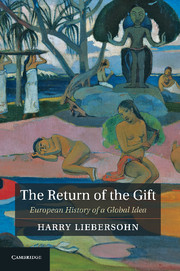5 - Marcel Mauss and the Globalized Gift
Published online by Cambridge University Press: 10 January 2011
Summary
The discoverers of gift exchange had no special talent for gift giving. In their fieldwork, the founding anthropologists preferred cash or its local equivalents to extract information and artifacts. Boas paid cash for Northwest Indian artifacts and for the services of George Hunt. Thurnwald made a point of avoiding gifts and keeping his relationships with his local aides business-like, making a mess of things when he made a present of a suit to his Banaro informant, Yomba. Malinowski bargained with islanders and worried like any tourist that he was being cheated. As in many commercial transactions, impersonal calculation may have been intertwined with friendship or other motives of gift exchange. Nonetheless, the anthropologists were unreflective about their methods of doing business and whether they might have learned more by entering into gift networks.
They were far less sensitive to the place of gift exchange in their own lives than Hastings in India a century before. Unlike their eighteenth-century predecessors, they did not inhabit a Europe of gift relationships that were as necessary as the air for their survival; in their modern societies of the late nineteenth and early twentieth centuries, business dealings seemed natural and sufficient. They encountered systems of gift exchange as foreign; hence, when Malinowski wanted to bring home the kula ring to his readers, he had to reach for the fusty example of royal heirlooms – a particularly nostalgic choice in the wake of the world war that turned the Russian, Austrian, and German monarchies into living memories.
- Type
- Chapter
- Information
- The Return of the GiftEuropean History of a Global Idea, pp. 139 - 164Publisher: Cambridge University PressPrint publication year: 2010



